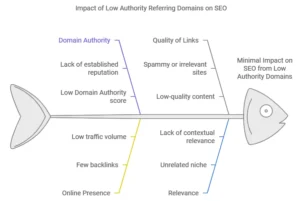Introduction to Off-Page SEO
Off-page SEO is a crucial part of any successful digital marketing strategy. Unlike on-page SEO, which focuses on optimizing the content and structure of your website, off-page SEO revolves around building authority and credibility through external sources. At the heart of off-page SEO is the concept of backlinks, but one often-overlooked metric that can significantly impact search engine rankings is the role of referring domains.
What Are Referring Domains?
In the context of SEO, referring domains are websites that link back to your site. For instance, if a well-known blog links to your website, that blog becomes a referring domain. Each unique website that provides a link to your content counts as a referring domain, and the diversity and quality of these domains play a huge role in boosting your site’s reputation in the eyes of search engines.
Importance of Referring Domains in SEO
Referring domains act as “votes of confidence” from various sources across the web. Search engines, like Google, perceive each link from a unique domain as a signal of trust. The more high-quality referring domains you accumulate, the stronger your site’s authority becomes, enhancing your chances of ranking higher in search results.
Quote: According to SEO expert Neil Patel, “The more unique referring domains a site has, the stronger its ability to rank highly in competitive search queries.” This highlights why diverse referring domains are essential to SEO success.
How Referring Domains Vs Backlinks
While referring domains and backlinks are closely related, they are not the same. Backlinks are the individual links pointing to your site, and you can have multiple backlinks from a single referring domain. However, the value lies more in obtaining links from multiple domains rather than numerous links from one source, as this signals a broader level of trust and recognition.
| Term | Definition |
|---|---|
| Referring Domain | A unique website that links to your site, enhancing credibility and authority |
| Backlink | An individual link to your site, which can come from the same referring domain multiple times |
| Domain Authority (DA) | A metric predicting how well a website is likely to rank on search engines |
Types of Referring Domains

High Authority Referring Domains
High authority domains are reputable and well-established websites, such as news outlets, academic journals, or industry leaders. Links from these sources significantly boost your website’s credibility and ranking potential.
Low Authority Referring Domains
Low authority domains are less established or may have a limited online presence. While they can still contribute to your link profile, focusing on quality sources is vital, as low authority links often have minimal impact on SEO.
Why Quality of Referring Domains Matters
The quality of referring domains is more important than quantity. A handful of links from high-quality, relevant sites can be far more effective than hundreds of links from low-quality domains. Quality links signal to search engines that your website is a trusted resource in your field, which ultimately helps you rank better.
Quote: Moz’s research indicates that “websites with a higher number of unique referring domains tend to rank better in search results than those relying on repeated backlinks from a few domains.”
Impact of Referring Domains on Domain Authority (DA)
Domain Authority (DA) is a metric developed by Moz that predicts a website’s ranking potential. Referring domains directly influence DA; high-quality referring domains contribute positively to this score, while low-quality ones may lower it. Therefore, gaining links from respected websites can be a game-changer for your SEO efforts.
Referring Domains and Search Engine Rankings
Search engines value referring domains because they indicate that your website has credibility across various sources. When multiple authoritative sites link to your page, search engines interpret this as a sign that your content is valuable, thus boosting your position on search engine results pages (SERPs).
Statistics on Referring Domains and SEO
Studies have shown the positive correlation between referring domains and search rankings. Here are some compelling statistics that highlight the importance of referring domains:
- Ahrefs found that 90.88% of pages get zero traffic from Google. A common trait of pages with high traffic is a larger number of referring domains.
- According to Backlinko, sites ranked #1 on Google have 168% more referring domains than sites in the #5 position.
- Moz research shows that websites with higher numbers of unique referring domains consistently perform better in SERPs compared to those with fewer referring domains.
| Metric | Statistic |
|---|---|
| Pages with Zero Google Traffic | 90.88% of pages get no Google traffic, often due to lack of referring domains |
| Top-Ranked Sites on Google | Sites in the #1 position have 168% more referring domains than those ranked #5 |
| Correlation Between Unique Domains and SERPs | High-ranking websites typically have more unique referring domains compared to competitors |
Measuring the Effectiveness of Referring Domains
Using SEO Tools for Referring Domains Analysis
Several SEO tools, such as Ahrefs, Moz, and SEMrush, allow you to track and analyze your referring domains. These tools provide insights into the number, quality, and relevance of your referring domains, helping you assess the effectiveness of your off-page SEO efforts.
Strategies to Get More Referring Domains
Creating High-Quality Content
Producing high-quality, shareable content is the foundation for attracting more referring domains. When your content provides unique insights or actionable information, other websites are more likely to link to it.
Guest Blogging and Outreach
Writing guest posts for other websites allows you to include links back to your site, increasing your referring domains. Additionally, outreach efforts targeting bloggers and industry influencers can help you acquire links from various relevant sources.
Social Media and Online Communities
Participating in social media discussions and online communities (like Reddit or industry forums) helps you connect with a larger audience. By sharing your content in these spaces, you increase the likelihood of it being picked up by others, leading to more referring domains.
Common Mistakes in Building Referring Domains
One of the most common mistakes is focusing too much on quantity over quality. Spammy or irrelevant links can harm your SEO more than they help. Additionally, relying on link-building schemes or low-quality directories can negatively impact your rankings.
How to Avoid Low-Quality Referring Domains
Avoiding low-quality referring domains involves being selective about where your links come from. By targeting reputable, relevant sites within your industry, you reduce the risk of harmful links while strengthening your link profile. Regularly audit your referring domains to identify and disavow any suspicious or harmful links.
Building a Natural and Diverse Referring Domain Profile
A natural link profile includes links from a variety of sources. Aim to get links from different types of sites—such as blogs, news sites, and forums—within your niche. This diversity helps demonstrate to search engines that your website is credible across multiple platforms and audiences.
The Role of Referring Domains in Competitive Industries
In highly competitive industries, a diverse and high-quality set of referring domains can set your website apart. Competitors with similar on-page optimization may still lag behind if they lack strong off-page signals. Therefore, building a solid foundation of referring domains is essential for staying ahead.
Conclusion
Referring domains play an essential role in off-page SEO success. By acquiring links from reputable and varied sources, your website can improve its authority, rank higher on search engines, and ultimately reach a broader audience. Focusing on quality over quantity and continuously diversifying your link profile will ensure your SEO efforts yield long-term results.
FAQs
1. What is a referring domain in SEO?
A referring domain is a unique website that links back to your site, acting as a “vote” that enhances your credibility in the eyes of search engines.
2. How many referring domains are ideal for good SEO?
There’s no specific number, but quality is more important than quantity. Aim for high-quality, relevant referring domains for optimal SEO results.
3. Can too many low-quality referring domains hurt SEO?
Yes, having too many low-quality or spammy referring domains can hurt your SEO and even lead to penalties.
4. How can I check my website’s referring domains?
You can use tools like Ahrefs, Moz, or SEMrush to analyze your referring domains and assess their quality.
5. Do social media links count as referring domains?
Most social media links are “no-follow,” meaning they don’t directly impact SEO. However, they can still drive traffic and increase your content’s visibility.

